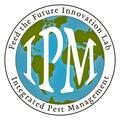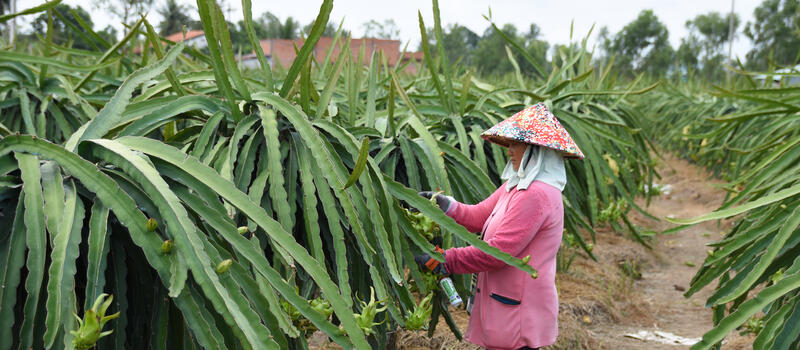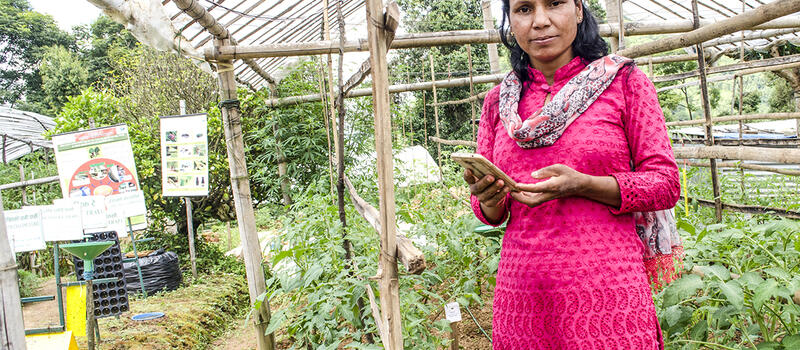Women, Integrated Pest Management, and Vietnam: Key Findings from the Field




Integrated Pest Management Innovation Lab
Nov 22, 2021

This post is written by Sara Hendery, Communications Coordinator of the Integrated Pest Management Innovation Lab.
In Vietnam, women play an important role in agriculture, but seldom have equal access to the information, inputs, and training needed for producing abundant, healthy harvests.
Virginia Tech’s Integrated Pest Management Innovation Lab initiated a project in Vietnam in 2014 focused on introducing ecological technologies to farmers of exportable fruit crops. Trainings on these technologies, including fruit bagging, application of the beneficial fungus Trichoderma, and application of neem oil, had limited participation from women. In collaboration with partners at the Southern Horticultural Research Institute and Virginia Tech’s Women and Gender in International Development, a technology assessment was conducted to identify gender-based constraints and opportunities to accessing these technologies and trainings.
The technology assessment confirmed that while key decisions about the farm in Vietnam are typically made by men, women are in fact incredibly active in on-farm decision making, specifically when it comes to management of family finances. Referred to as the “safety keepers,” or the safety net of the family, women make decisions around farm purchases, such as purchases of pesticides or fertilizers, and manage hired labor. The assessment also showed that women are increasingly interested in learning about pesticide alternatives, and are concerned about the health impacts of pesticide use.
Barriers to technical access identified
A number of barriers limiting women’s ability to access such knowledge through technical trainings were revealed, including:
- Abundant household responsibilities and care of young children
- Low confidence in public speaking or participating in open dialogues
- Assumptions that “official” training invitations are not intended for women, because invitations are often addressed to the (male) head of the household
With these findings, the institute team, made of entomologists, plant pathologists, and other researchers who deliver technical trainings, adjusted their approach to engage women more thoughtfully. One of the most successful approaches was tapping women’s associations and unions to participate in technical trainings. The institute team also began conducting trainings with women only, which significantly increased women’s attendance, but more so women’s active participation in the training conversation. Another successful approach was encouraging women farmers to keep farm diaries of training lessons learned as well as farm updates, such as pesticide spraying dates. Following women farmers’ interest, the institute conducted multisubject trainings that focused on both technical crop protection information and financial information.
Multiplier effect of training
Many of the women farmers who participated in the technology assessment noted that technical training is beneficial on multiple levels.
“Listening to instructions, I can learn new knowledge and experience from others,” says one female mango farmer in Vietnam. “As my husband forgets something, I can remind him.”
While women’s participation in technical trainings did increase with these tactics, the COVID-19 pandemic brought unique challenges and outcomes. As researchers could no longer travel to farmer homes to deliver assistance, trainings were held over video call. This online space allowed for both men and women to attend the training together. While this virtual training did foster increased participation of men and women, it was clear that women were often preoccupied with housework during the instruction and sometimes wouldn’t stay for the entire training.
Daniel Sumner, assistant director of Women and Gender in International Development, says this shift to online training highlighted an important factor that can limit or foster women’s participation in technical trainings: location.
“Women are making major decisions about on-farm purchases, which is why it’s crucial women attend trainings to better understand the product options and what would be most productive, effective, and safe for their farms and families,” he says. “We need to continue to look at where we host trainings and be more intentional about these locations by choosing spaces accessible to women. Equally important is developing messaging, virtual or otherwise, that would engage husband and wife together, rather than separately.”
Gender-targeted training opportunities grow
While increased efforts of the Southern Horticultural Research Institute to engage women improved women’s participation in technical trainings, the Women and Gender in International Development team see further opportunities for maximized engagement, such as:
- Developing more targeted criteria for engaging farm households, including engaging farmer associations led by women
- Developing cooking courses to help women farmers produce products from their farm fruits to be sold at the market
- Inviting trusted community professionals, such as health care professionals, to share with farm families the importance of reduced reliance on pesticides
- Engaging farmers in remote or mountainous areas, where minority farmers often live
- Leveraging information and communications technology to engage more women
- Designing trainings that prioritize women’s interests in finance management, especially trainings on information about the market and farm cost-saving measures
“A crucial finding from this work is that we must continue to ask what women what they are interested in,” says Maria Elisa Christie, director of Women and Gender in International Development. “In Vietnam, women are interested in financial and market information – now we have designed training modules to reflect that. Additionally, it’s important not only to work with women’s organizations to engage women, but to work in women’s spaces. For example, we find that many women like to cook together after a training. These spaces can be leveraged for maximized participation.”

